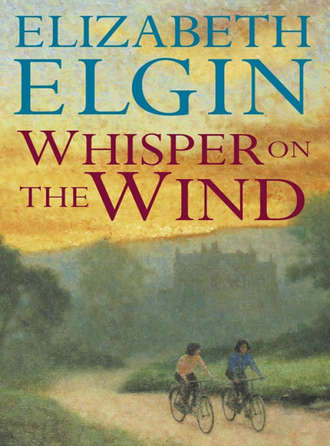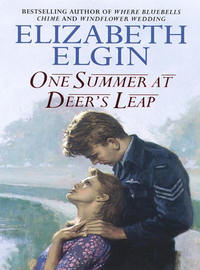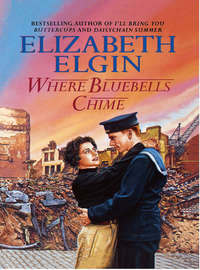
Полная версия
Whisper on the Wind
‘Wonder what Roz is up to on her first day as a farm-worker?’ she offered cautiously, but her effort was wasted, for she got no reply. Not that she’d expected one, but it had been worth a try.
If only, she sighed inside her, Mrs Fairchild didn’t take on so about Ridings. If only she would accept that none of this was any of her doing, that there was no price to be paid for what happened all those years ago. But she blamed herself and always would, the proud, foolish woman.
‘Damn that magpie,’ she muttered. ‘Damn the evil creature!’
Washing milk bottles and placing them in the sterilizer required little in the way of concentration and allowed for chatter. It must also, Kath decided, be the warmest job on the farm this bleak, winter morning.
‘There now.’ Roz smiled. ‘Just the milk churns to scald and the floor to mop …’
‘You know so much about it,’ Kath sighed, ‘and I don’t know anything at all. I’m a dead loss.’
‘You’ll soon learn – get used to the routine and the seasons. It’s the seasons that govern farming. I don’t really know a lot; it’s just that I seem to have been in and out of Home Farm since ever I can remember. It grows on you, I suppose. It was only yesterday they told me officially that I could stay on and work here. I’d half expected to be called up, you know. What’s it like, Kath, leaving home and living in a hostel?’
‘It’s going to be great. The Forewoman is fine and the Warden, too. They were really concerned because there was nowhere for me to sleep but the attic. And I didn’t mind at all. I hope they leave me there. It’s the first time I’ve ever had a room to myself – can’t get over the novelty …’
‘You’re from a big family, I suppose,’ Roz demanded, enviously.
‘Yes, you might say that.’ Her laugh was genuine. ‘As a matter of fact I was brought up in an orphanage.’
Best get it over with; let everyone know, right from the start. You knew where you stood, then, with people.
‘Oh, Kath, I’m sorry – well, sorry if it was awful, I mean. I didn’t mean to pry.’
‘It’s all right.’ She laughed again at the sight of the bright red face. ‘And I don’t really know if it was awful – I’ve never known anything else, you see. I was left outside a police station when I was two weeks old. That much I do know because there was a piece of paper pinned to my blanket with Kathleen written on it and my date of birth. They gave me that paper and the blanket when I left the orphanage and they’d already given me the surname Sykes after the policeman who found me, but I’m Kathleen Allen, now. That name is really mine.’
‘Then that makes two of us,’ Roz hastened, eager to make amends, ‘because I’m an orphan, too. My parents were killed in a car crash in Scotland, though what possessed them to leave me with Gran and go careering off just days before Christmas, I’ll never know.
‘It’s just about now that it happened. Gran hates this month. All the awful things have happened in December. And I’m sorry if I seemed rude, but I didn’t know –’
‘Of course you didn’t and I don’t mind about it any more. Can’t change things, can you, though sometimes I wish I knew who I really am and if my name is O’Malley or Rafferty or Finnegan.’
‘Why Irish names?’
‘Because that’s what I think I am. Kathleen – it’s an Irish name, isn’t it? And Barney’s aunt says my colouring is Irish.’
‘Then I wish I had it,’ Roz sighed. ‘This red hair is no end of a nuisance. Poll Appleby says I’m a throwback.’ She laughed out loud. ‘Quite an act we’re going to be – an orphan and a throwback, wouldn’t you say?’
Kath laughed with her. In spite of her accent, Roz seemed not to mind about the orphanage and her not being wanted, because not being wanted was the worst part of the whole thing. She could still weep, if she let herself, for that two-week-old baby; still felt grateful to Barney for giving her an identity. ‘That’s the floor finished,’ she said. ‘Now what?’
‘Well, the leftover milk is put in the churns for the milk-lorry to collect. Jonty usually does that, but I suppose we’ll be doing it now. I’ll ask him.’
‘I like your boyfriend,’ Kath confided. ‘Lovely and tall, isn’t he? Doesn’t look like a farmer, though. More the studious type, but I suppose that’s because of his glasses. D’you know, when he took them off he looked really handsome.’
‘Jonty? You’re talking about Jonty?’ Roz squeaked. ‘He isn’t my boyfriend! Whatever gave you that idea?’
‘Sorry! Must have got it wrong. I thought, you see, that –’ That when a man looked at a girl the way he looked at Roz, his eyes gentle and loving, following every move she made, his face lighting up the minute he walked into the room and saw her there … ‘that – well, I got it wrong, I suppose.’
‘You certainly did! My boyfriend is called Paul. He’s aircrew, over at Peddlesbury. I’m seeing him tonight. You’ll be coming, won’t you, to the dance? But Jonty – well, he – he’s Jonty. He’s been there as long as I can remember. More like a brother, really, and you don’t fall in love with your brother, now do you?’
You don’t, Kath agreed silently; of course you don’t. But he isn’t your brother, Roz, and he is in love with you; deeply in love, and you don’t know it, she wanted to cry. Instead she said, ‘Don’t think I’ll be coming to the dance. Most of the girls at the hostel are going, but I want to get properly settled in, and wash my hair tonight. I’ll be there next time, though.’
It was strange that a married woman could go to dances now without her husband – provided she went with a crowd and came home with a crowd. ‘What do we do now?’ she asked.
‘Don’t really know. This is my first day here, too, but we’ll be all right once Mat decides what to do with us. Think we’d better pop over and ask. Leave your gum-boots at the door, by the way. Grace doesn’t allow them in the kitchen. And Kath – I’m glad you’re here.’
‘Me, too.’
She was. And happy to be living in the country, even though it was winter and unbearably cold. There was such a feeling of rightness about being here, of belonging, that she felt sure she had been born of country stock. She saw nothing of the drabness of dead, cold earth nor of winter-bare trees, only the beauty of skeletal oaks and beeches, stark against a grey velvet sky. This morning, the early light had gilded everything it touched so that all around her had looked like a picture in a shop window.
She wasn’t just happy and glad and sure, now, that she had been right to become a landgirl – there was something else, too; something she couldn’t define or even begin to understand. Yet it was there, churning inside her like the day she had volunteered, and yesterday, when the front door banged behind her and she had known there was no going back. Now it was there again, only stronger than ever before; a feeling of joy waiting to explode; a certainty that one day, just around a corner, something wonderful awaited her. It made her feel glad and afraid and happy and guilty.
She swallowed hard and kicked off her gum-boots. Guilty? Whatever could there be to feel guilty about?
‘Wait!’ she called urgently. ‘Wait for me, Roz!’
Huddled into her coat, Roz waited at the door of the gymnasium in which the dances were held. Already the music had started, but she always slipped away as the local girls and the landgirls from Peacock Hey climbed down from the RAF truck and filed through the heavily-curtained doors. No use their meeting inside when the need to hold each other and kiss away the time between was so urgent. Always, the first to arrive would wait in the darkness and tonight it was she, Roz, who stood unmoving, ears straining against the music for a whispered, ‘Roz? You there, darling?’
She dug her hands deeper into the pockets of her coat, calling back the night of their meeting, marvelling at the intensity of their love. She had never thought it could be like this; never imagined that loving this deeply could have so changed her life.
When she was very small and her prayers had been said, she would whisper, ‘And please let me marry a prince, God, so Granny and me can live at Ridings for ever.’ And later, when she understood how large bills could be and how very little money they had she would yearn, Wouldn’t it be lovely to fall in love with someone rich; someone who would care for Ridings as we do …
But all that changed the night she and Paul met. Even the old house and the need to hold on to it would come a poor second, had she been asked to choose between it and Paul.
Now she was in love; deeply and for ever in love as Gran had been and most times her happiness was shining and golden. There were the bad bits, she admitted, when the squadron took to the air over Peddlesbury and she was sick with anxiety until they were back and the phone rang and a voice whispered, ‘Hi! I love you.’ She never minded so brief a message; not when it really meant he was safely home, and that soon they would meet.
But what would happen now with the morning milk-round to be done and she no longer able to wait beside the phone to snatch it up immediately it began to ring, Roz worried. She couldn’t ask Gran to take a message because Gran didn’t know about Paul, and to wait for a call at the phone box in the village during the milk-round wouldn’t work, even with Kath to help, because she never knew when he would be back. She determined to talk to Paul about it. There had to be some other way he could let her know he was all right.
She heard his footfall on the gravel – that was something else about being in love, knowing the way your man walked, even in the blackout. She coughed and he called, ‘Roz? Sweetheart?’ All at once everything was all right again and they were touching and kissing and oh, dear, sweet Heaven, how she loved him.
‘I missed you,’ she whispered.
‘Two days?’ His laugh was indulgent.
‘Two hours,’ she murmured, ‘is too long. They’re getting worse, Paul, the bits between.’
Practically all she did between their meetings was fervently wish away the hours and days until they were together again.
‘Why can’t we be married, Paul?’
‘Because I’m flying and you aren’t twenty-one.’
‘That’s no excuse, and you know it. And it isn’t what I meant. You know what I’m trying to say.’
‘Sssssh.’ He tilted her chin, searching with his mouth for hers, but she jerked her head aside.
‘No, darling! I won’t be shushed! It’s getting unbearable, the way I want you!’
‘And you think I don’t want you? Haven’t you thought it might be every bit as bad for me? When I’m flying I’m thinking, “Christ, I was mad to get into this mob. Suppose we don’t make it back? Suppose I never see her again …”’
‘Then why, darling, when we love each other so much?’
‘Because it wouldn’t be fair to you. What kind of a mess would you be in if something went wrong, then I didn’t get back?’
‘If you didn’t come back, don’t you think it’s all the more reason for us to have loved – really loved?’
‘Roz, sweetheart. You might get pregnant and I might be killed.’
‘Don’t!’ She stiffened in his arms, sudden fear taking her. ‘Don’t ever say that word again – not ever! I love you, Paul Rennie. I want to be with you always. Fifty years from now, I want to be with you!’
‘I’m sorry.’ His voice was low with regret.
‘And I’m sorry, too, so let’s not talk about it any more – well, not tonight.’ She pressed close again, touching his chin, his cheek, the tip of his nose with little teasing kisses. ‘Only I do love you so. And I want you. Nothing will change that.’
‘And I love you. I’ve always loved you. And I want you, too.’
He unbuttoned his greatcoat then wrapped her into it, pulling her even closer. Their lips met and both knew the need to belong and both silently accepted its inevitability.
Roz stood contented against him. She didn’t speak. She didn’t have to. They would be lovers. The time would come and they would each recognize the moment. If she got pregnant and if she were left alone, then she would manage somehow. Women usually did. Only never to have belonged, even briefly, would be unbearable.
Presently she stirred in his arms. ‘Let’s go into the dance,’ she whispered.
3 1942
A crescent moon lay pale in the sky; the early morning air was sharp. Another year, a new, exciting beginning. Kath pedalled briskly, more sure of the road now, thinking back to the happiest Christmas she had ever known.
It had started with the same too-early call, for even on Christmas Day farm animals must be fed and watered, the cows milked, and she had done the morning round with Roz, touched to find greetings cards and small gifts left beside empty bottles.
When they had finished the dairy work and put out dishes of milk for the seven farm cats, they gathered in Grace’s kitchen to drink a toast to victory in carefully-hoarded dandelion wine and wished each other a happy Christmas.
‘No more work today,’ Mat had smiled, over his glass. ‘Off home, the pair of you.’
It was sad, Kath thought, that Barney’s letter should be there when she got back to Peacock Hey a little before noon, and even though she had been expecting it for days, she wished it could have waited until tomorrow or have arrived a day earlier, for nothing at all should be allowed to spoil the joy of this special Christmas. This day above all others she wanted to think kindly of her husband, not shrink from his disapproval; wanted to laugh a lot and eat Christmas dinner with the landgirls who were drifting back to the hostel in ones and twos, the remainder of the day their own. Carefully she slit open the envelope, steeling herself against her husband’s anger.
The letter from North Africa confirmed her worst fears. Barney’s reply was crisp with dissent, accusing her of deceit when she must have known all along that no married woman could be made to do war work away from her home. It was open condemnation; it hurt her deeply.
Selfish, that’s what you are, Kath. The minute I’m gone you’re parading around in uniform making an exhibition of yourself and against my wishes, too …
She swallowed hard, anger rising briefly inside her. She was not parading anywhere and if getting up at half-past five to deliver milk on a pitch-black winter morning was making an exhibition of herself then yes, she supposed she was.
Well, Kath, you’ve made your bed so you’ll have to lie on it. It’s too late now for regrets. You’re stuck with it for the duration, so don’t come crying to me, Barney warned, when you realize you’d best have stayed at home.
She took a deep, calming breath then pushed the letter into the pocket of her jacket, acknowledging that perhaps Barney could be right, that maybe she had been just a little deceitful. When dinner was over, she would sit down at once and tell him how sorry she was; not sorry for joining, she could never be that, but for not asking him first. Then she would tell him about Alderby and Roz and little Daisy; about Mat and Grace and the tractor she was learning to drive. He’d be pleased to hear about the Post Office bank account she had opened and into which every penny of her Army allowance was being paid.
She would not, she determined, tell him about Jonty yet awhile, for young men who did not answer their country’s call made Barnaby Allen’s hackles rise. Nor would she tell him, ever, about the prisoner of war soon to arrive at Home Farm. Barney held all things Teutonic in contempt and it would do nothing for his peace of mind to learn that his wife might soon be working alongside the Germans’ closest ally.
Lastly, she would tell him that she loved him and missed him and thought about him a lot, for no matter what a letter contained or what it omitted to mention, the loving and the missing was an essential part of every letter to every serviceman overseas.
Now that letter was on its way and the new year nearly six hours old. Surely Barney would come to understand that this was the first real freedom she had ever known – might ever know – and that she must be allowed to make the most of every single day. Soon, her loving letters would reassure him, let him know how deeply she cared.
‘A happy new year, Barney,’ she whispered. ‘Take care.’
‘Happy new year!’ Roz was loading milk-crates on to the trap when Kath arrived at Home Farm. ‘Up early, aren’t you? Don’t tell me you haven’t been to bed.’
‘No such luck. No parties for me last night; Paul was flying. Make you sick, wouldn’t it, flying ops on New Year’s Eve and not one of them back yet. Lord knows where they’ve been all this time. Even if it was Berlin, they should have been back before now.’
‘They will be,’ Kath consoled. ‘It’s early, yet.’ And dark, and almost two hours still to go before the blackout could be lifted. ‘He’ll be all right, I know it. You’ll see him tonight.’
‘Yes I will. I know I will. Look, Kath – can I ask you something a bit personal?’
‘Try me.’
‘Well, were you a – a virgin when you married Barney?’ The words came in a tumble of embarrassment. ‘What I’m trying to say is –’
‘Was I a virgin when we married or had we been lovers?’ Kath looked at the downcast eyes, the pink spots on the young girl’s cheeks. How naïve she was, how painfully unworldly. ‘Well, since you ask, no, we didn’t make love. Mind, we got into a few heavy clinches from time to time, but one of us managed to count up to ten in time.’ One of us. Always me. ‘But it was very different, you see, when we were courting.’ They could talk about tomorrow because then there had been a tomorrow; lovers weren’t snatched apart and homes broken up, children left fatherless. Once, there had been all the time in the world. ‘But what brought all this on?’
‘Oh, I don’t know. There isn’t an awful lot going for it these days, is there – being a virgin, I mean. I wish I weren’t. Does that make me sound like a tart, Kath?’
‘No. In fact I think it must be awful for you, loving Paul so much. Why is it,’ she demanded, ‘that we’re old enough to go to war but not old enough to get married till we’re twenty-one? Crazy, isn’t it? You’re worrying about Paul, aren’t you?’
‘Yes. I always do. I’d have thought they’d have started getting back long before this.’
‘They’re a bit late, that’s all – a headwind, maybe. Well, they can’t all be –’ She stopped, biting back the word missing. ‘What I’m trying to say is –’
‘Ssssh. Quiet!’ Ears straining, Roz gazed into a sky still inky dark. ‘There’s one of them now, I’m sure it is!’
It was several seconds before Kath could hear the faint tired drone of aircraft engines but then, she considered, she wasn’t waiting for the man she loved to come back from a raid over Germany; wouldn’t keep tally as each one thrashed overhead and circled the aerodrome, asking for permission to land, waiting for the runway lights to be turned on.
‘How many went? Did you count them?’
‘Yes.’ Roz always counted. ‘Eleven last night.’
‘Fine. Then we’ll count them in, shall we?’ Kath opened the delivery book. ‘Any cancellations?’
‘None. Ivy Cottage would like an extra pint, if we’ve got one to spare, that’s all.’ She glanced up again, relief in her voice. ‘It’s them, all right, and that’s the first. I wonder where they’ve been till now?’
‘He’ll tell you tonight.’ Kath smiled. ‘By the way, I don’t suppose you’d remembered that it’s today the Italian is coming?’
‘Could I forget? Gran’s still going on about it.’
‘I wonder what he’ll be like.’
‘Oh, short, fat and greasy, according to Gran, and every bit as bad as a German.’ Roz shrugged, only half listening.
‘I always thought Italians were tall, dark and romantic.’
‘I couldn’t care less what he’s like. All I want is for him to keep out of Gran’s way and help out with the ploughing. Oh, come on. Let’s make a start.’
She glanced up sharply as the first of the homecoming Lancasters roared in low over Alderby. She didn’t speak, but already the words ‘Ten to go’, had formed in her mind and ‘Please God, ten more. Please.’
Kath was leading Daisy into her loose box when the truck stopped at the farm gate. Arms folded, she stood to watch.
The man who jumped out at a sharp command from the guard was tall and young and fairer than she would have thought.
‘Come on, you! Chop chop, there! We haven’t got all day!’
The guard was the smaller of the two and a great deal older but he carried a rifle on his shoulder, so size and age didn’t count for a lot, Kath reasoned. Perhaps his animosity sprang from a still-remembered Dunkirk or a bomb-shattered home. You couldn’t blame him, she supposed, for throwing his weight about a bit.
‘The prisoner’s here.’ She closed the dairy door against the cold. ‘A guard has just taken him inside.’
‘Damn!’ Roz set down a crate of bottles with a rattle. ‘I was hoping he wouldn’t arrive. Gran swears she’ll have rid of him just as soon as Mat can find someone else and she will, nothing’s more certain, once the ploughing is done.’
‘Is it possible to hate someone so much?’
‘Gran can.’ Roz ran to the door, wrenching it open, her eyes sliding left and right. ‘Listen! There it is. That’s eleven back! Now what do you suppose kept them?’
‘Does it matter?’ Kath flinched as the massive black shape thundered low over the farm. ‘They’re all home.’
‘Yes,’ Roz sighed, eyes closed. ‘Don’t ever fall for aircrew.’
‘I won’t be falling for anyone. I’m married – remember?’
‘You know what I mean. Look, I’ll scald the churns this morning; you feed the cats, will you?’
Suddenly it was a wonderful day. All at once, at the count of eleven, the cold grey morning was bright with magic. Paul had completed his thirteenth op; the dicey one was behind him. Now surely it would be all right until the last one; until the thirtieth. And tonight they would meet. Perhaps they would dance, perhaps they would walk in the darkness, hands clasped, thighs touching, just glad to be together. Tonight, they might even be lovers.
She closed her eyes, sending silent thanks to the god who had brought eleven crews safely back, knowing that tomorrow or the next day she would once more be counting the bombers out and willing them home again; living through a fresh anguish.
But tonight she and Paul would be together. Tonight was as sure as anything could be in this mad, uncertain world, and tomorrow, and all the uncertain tomorrows, were a million years away.
At eleven o’clock, when they began to wonder if tea-break had been forgotten, Grace called them in to the warmth of the kitchen.
‘Sorry it’s late. I’ve been over to Ridings with drinkings for the men and I stayed to watch. Jonty’s made a start with the tractor and Mat and the prisoner are trying out Duke, and the hand-plough. It’s good to see Duke working. I’m glad we didn’t get rid of him.’ She smiled.
Few farmers had kept their horses once tractors came within their means, but Mat Ramsden loved horses and the great grey Shire was a joy to him.
‘Tractors don’t need feeding and mucking-out,’ some had scoffed.
‘Aye, I’ll grant you that, but my Shire runs on hay which isn’t rationed like tractor fuel is and it don’t have to be brought here, neither, in a convoy. And what’s more,’ he’d grinned, ‘you don’t get manure from tractors!’
Duke weighed a ton, almost, and his hooves were the size of a dinner plate. Such creatures were living miracles, Mat declared; tractors were cold, smelly contraptions and bother or not, the Shire horse had stayed.
‘I’m glad they’ve made a start.’ Roz watched the saccharin tablet rise fizzing to the top of her cup. ‘That ploughing business was really getting Gran down. Will it be finished on time, Grace?’
‘It will.’ The reply was quietly confident. ‘My, but it was grand to see that land getting turned over, coming to life after all those years.’
She had stood there, jug in hand, watching the plough bite deep into the sward; watched it rise green then fall dark and soft as a wave falls on the shore. She had smiled to see the seagulls wheeling overhead then settling in the wake of the plough, grabbing hungrily for grubs. Yes indeed, those long-idle acres were stirring themselves at last.







